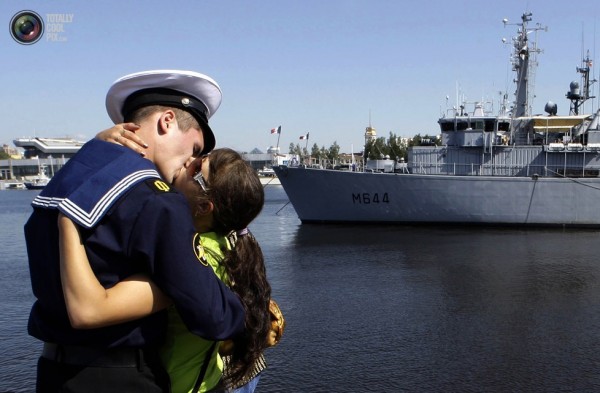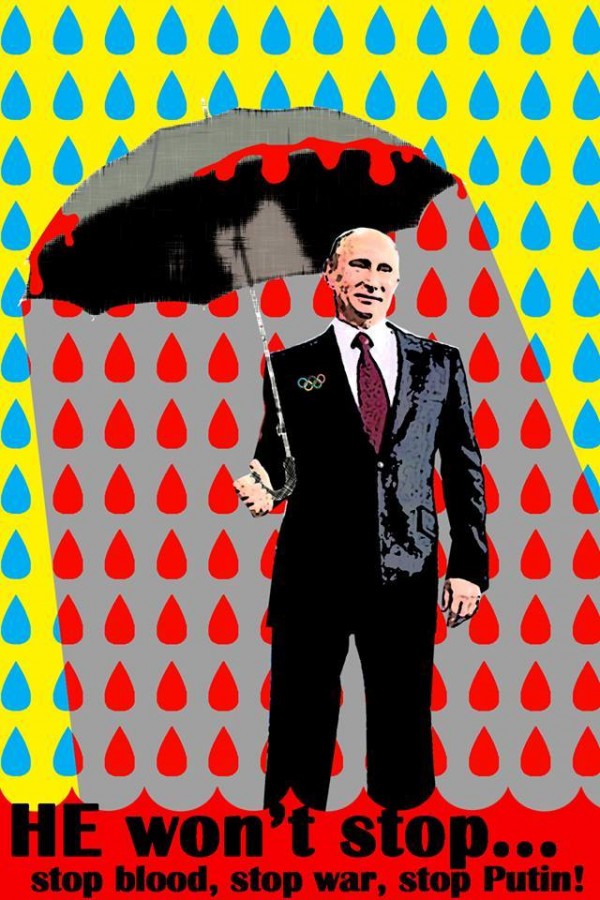Notes
Cold War Kiss: On Russia, the U.S. and the “Return to Normalcy"
A sailor kissing a woman in public is not exactly news. But this photograph of a Russian sailor kissing a woman in St. Petersburg bears enough similarity to what is perhaps one of the most famous pictures in the American family photo album that it warrants just a little bit of consideration on our part.
Alfred Eisenstadt’s “Times Square Kiss”— often dubbed “Return to Normalcy”—marked VJ Day and the effective end of World War II. Every ending is a beginning, of course, and so one might also imagine it as the beginning of the post war era which soon became known as the “Cold War” and extended until the fall of the Berlin Wall and the dissolution of the Soviet Union in 1991. The “War on Terror” has redefined our understanding of the East-West split in the intervening years and the Russian threat to the West has generally been muted by its relatively weak economic condition and its willingness to cooperate on a number of small scale international initiatives. Muted, that is, until the Putin administration, which has demonstrated its willingness to resist entreaties from the G8, NATO, and the United States on a range of issues beginning, not least, with the civil war in Syria. And now with the Russian “occupation” of the Crimean peninsula and President Obama’s warning that this this will be seen as a serious threat to the US and the West, it is fair to say that we may be moving in a new and different direction in our mutual co-exsitence—and it is not entirely clear that we have an effective or useful vocabulary to describe the mentality that will govern this new relationship. But back to the picture of the sailor and the woman kissing.
The photograph appeared in an on-line slide show on the Russian military that was posted two days before the Russian Parliament authorized a military takeover of the Crimea. Most of the photographs in the slide show focus on members of the Russian military in training and, truth-to-tell, in many instances it would be difficult to distinguish what we see from training sequences in almost any modern military organization across the globe, including the US military. But there are also a number of photographs that mark the scene as distinctively Russian, and more, link Russia with the image of its authoritarian, anti-Western, Soviet past, including near iconic images of soldiers and tanks making their way through Moscow’s Red Square in a show of strength. And then, near the middle of the slide show we find the picture of the kiss. And one can only wonder what it is doing in a photo essay otherwise dedicated to posing the question: does the Russian military pose a threat to the West? It could be an ironic gesture that serves to damper what else appears to be the projection of a hostile and belligerent nation state. See, they are just like us, humans caught up in the worldly tensions between Eros and Thanatos, and we need to identify with them as such with all of their foibles intact. Or, it could be a more cynical gesture to a “Return to Normalcy” where the war was “cold” and we could identify who our enemies were–after all, that’s not exactly Times Square in the background and the kissers are not exactly front and center. Comedy or tragedy, its really a matter of what we choose to see.
Secretary of State John Kerry was quoted on the Sunday morning talk shows as indicating that the current situation “is not Rocky IV.” We can only hope so, for it would be all too easy to “cry havoc, and let slip the dogs of war.” We have had too much of that in recent years. And so, to return to where we began, no, a sailor kissing in a woman in public is not exactly news. But then again, perhaps that’s exactly the point.
— John Luciates
(cross-posted from No Caption Needed.)
(photo: Alexander Demianchuk/Reuters)



Reactions
Comments Powered by Disqus